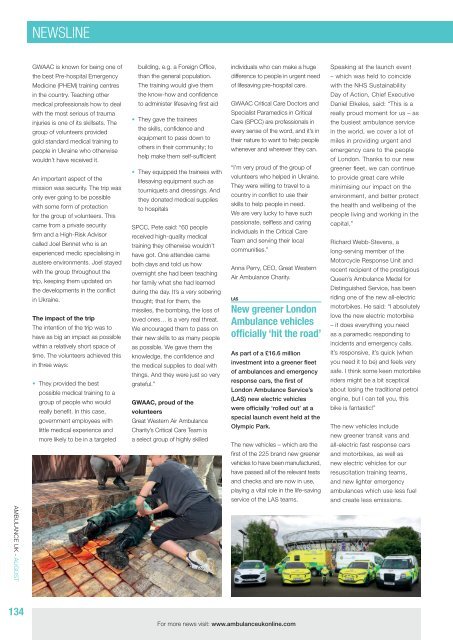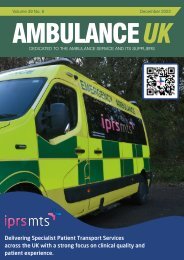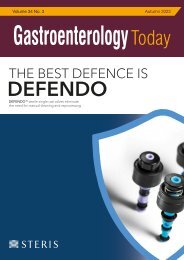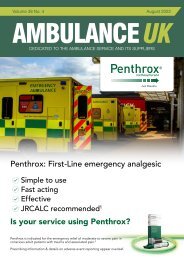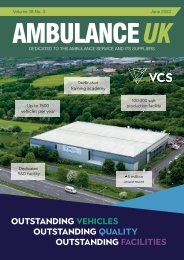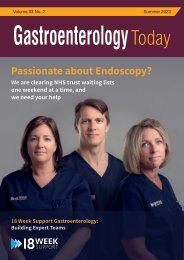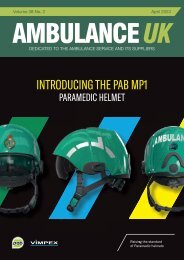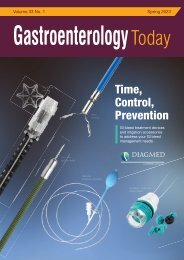Ambulance UK August 2022
Ambulance UK August 2022
Ambulance UK August 2022
Create successful ePaper yourself
Turn your PDF publications into a flip-book with our unique Google optimized e-Paper software.
NEWSLINE<br />
GWAAC is known for being one of<br />
the best Pre-hospital Emergency<br />
Medicine (PHEM) training centres<br />
in the country. Teaching other<br />
medical professionals how to deal<br />
with the most serious of trauma<br />
injuries is one of its skillsets. The<br />
group of volunteers provided<br />
gold standard medical training to<br />
people in Ukraine who otherwise<br />
wouldn’t have received it.<br />
An important aspect of the<br />
mission was security. The trip was<br />
only ever going to be possible<br />
with some form of protection<br />
for the group of volunteers. This<br />
came from a private security<br />
firm and a High-Risk Advisor<br />
called Joel Bennet who is an<br />
experienced medic specialising in<br />
austere environments. Joel stayed<br />
with the group throughout the<br />
trip, keeping them updated on<br />
the developments in the conflict<br />
in Ukraine.<br />
The impact of the trip<br />
The intention of the trip was to<br />
have as big an impact as possible<br />
within a relatively short space of<br />
time. The volunteers achieved this<br />
in three ways:<br />
• They provided the best<br />
possible medical training to a<br />
group of people who would<br />
really benefit. In this case,<br />
government employees with<br />
little medical experience and<br />
more likely to be in a targeted<br />
building, e.g. a Foreign Office,<br />
than the general population.<br />
The training would give them<br />
the know-how and confidence<br />
to administer lifesaving first aid<br />
• They gave the trainees<br />
the skills, confidence and<br />
equipment to pass down to<br />
others in their community; to<br />
help make them self-sufficient<br />
• They equipped the trainees with<br />
lifesaving equipment such as<br />
tourniquets and dressings. And<br />
they donated medical supplies<br />
to hospitals<br />
SPCC, Pete said: “60 people<br />
received high-quality medical<br />
training they otherwise wouldn’t<br />
have got. One attendee came<br />
both days and told us how<br />
overnight she had been teaching<br />
her family what she had learned<br />
during the day. It’s a very sobering<br />
thought; that for them, the<br />
missiles, the bombing, the loss of<br />
loved ones… is a very real threat.<br />
We encouraged them to pass on<br />
their new skills to as many people<br />
as possible. We gave them the<br />
knowledge, the confidence and<br />
the medical supplies to deal with<br />
things. And they were just so very<br />
grateful.”<br />
GWAAC, proud of the<br />
volunteers<br />
Great Western Air <strong>Ambulance</strong><br />
Charity’s Critical Care Team is<br />
a select group of highly skilled<br />
individuals who can make a huge<br />
difference to people in urgent need<br />
of lifesaving pre-hospital care.<br />
GWAAC Critical Care Doctors and<br />
Specialist Paramedics in Critical<br />
Care (SPCC) are professionals in<br />
every sense of the word, and it’s in<br />
their nature to want to help people<br />
whenever and wherever they can.<br />
“I’m very proud of the group of<br />
volunteers who helped in Ukraine.<br />
They were willing to travel to a<br />
country in conflict to use their<br />
skills to help people in need.<br />
We are very lucky to have such<br />
passionate, selfless and caring<br />
individuals in the Critical Care<br />
Team and serving their local<br />
communities.”<br />
Anna Perry, CEO, Great Western<br />
Air <strong>Ambulance</strong> Charity.<br />
LAS<br />
New greener London<br />
<strong>Ambulance</strong> vehicles<br />
officially ‘hit the road’<br />
As part of a £16.6 million<br />
investment into a greener fleet<br />
of ambulances and emergency<br />
response cars, the first of<br />
London <strong>Ambulance</strong> Service’s<br />
(LAS) new electric vehicles<br />
were officially ‘rolled out’ at a<br />
special launch event held at the<br />
Olympic Park.<br />
The new vehicles – which are the<br />
first of the 225 brand new greener<br />
vehicles to have been manufactured,<br />
have passed all of the relevant tests<br />
and checks and are now in use,<br />
playing a vital role in the life-saving<br />
service of the LAS teams.<br />
Speaking at the launch event<br />
– which was held to coincide<br />
with the NHS Sustainability<br />
Day of Action, Chief Executive<br />
Daniel Elkeles, said: “This is a<br />
really proud moment for us – as<br />
the busiest ambulance service<br />
in the world, we cover a lot of<br />
miles in providing urgent and<br />
emergency care to the people<br />
of London. Thanks to our new<br />
greener fleet, we can continue<br />
to provide great care while<br />
minimising our impact on the<br />
environment, and better protect<br />
the health and wellbeing of the<br />
people living and working in the<br />
capital.”<br />
Richard Webb-Stevens, a<br />
long-serving member of the<br />
Motorcycle Response Unit and<br />
recent recipient of the prestigious<br />
Queen’s <strong>Ambulance</strong> Medal for<br />
Distinguished Service, has been<br />
riding one of the new all-electric<br />
motorbikes. He said: “I absolutely<br />
love the new electric motorbike<br />
– it does everything you need<br />
as a paramedic responding to<br />
incidents and emergency calls.<br />
It’s responsive, it’s quick (when<br />
you need it to be) and feels very<br />
safe. I think some keen motorbike<br />
riders might be a bit sceptical<br />
about losing the traditional petrol<br />
engine, but I can tell you, this<br />
bike is fantastic!”<br />
The new vehicles include<br />
new greener transit vans and<br />
all-electric fast response cars<br />
and motorbikes, as well as<br />
new electric vehicles for our<br />
resuscitation training teams,<br />
and new lighter emergency<br />
ambulances which use less fuel<br />
and create less emissions.<br />
AMBULANCE <strong>UK</strong> - AUGUST<br />
134<br />
For more news visit: www.ambulanceukonline.com


